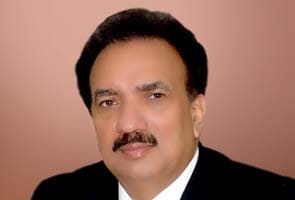
Islamabad:
Admitting that the trial of Lashkar-e-Toiba's (LeT) Zakiur Rehman Lakhvi and six others charged with involvement in the Mumbai attacks is "stuck", Pakistan has said the formation of a commission to record the testimony of two key Indian witnesses is necessary to take things forward.
Interior Minister Rehman Malik - who had a meeting with Indian High Commissioner Sharat Sabharwal in Islamabad on Saturday morning - contended that the trial of the Pakistani suspects has run into problems over the issue of Indian witnesses testifying via video-conferencing as this is not allowed under Pakistani laws.
He said he had discussed the formation of the commission comprising "relevant officials" - which would visit India to record the statements of a magistrate and a police officer - during a recent telephonic conversation with his Indian counterpart P Chidambaram.
Chidambaram had told him that the Pakistani proposal would be "examined" when it is received, Malik told reporters after meeting Sabharwal at the Interior Ministry.
The Pakistani anti-terrorism court conducting the trial is yet to decide on India's proposal that the witnesses should testify via video-conferencing "and the trial is stuck," he said.
"We want this trial to go ahead. That's why I have proposed to India, while talking to Mr Chidambaram, that how about if we move our case to our trial court and request them to appoint a commission?" he said.
Pakistani prosecutors will approach the Rawalpindi-based trial court on Monday with a petition on forming the commission, he said.
Though India proposed that the testimony of the two witnesses - the magistrate who recorded the confessional statement of lone surviving Mumbai attacker Ajmal Kasab and the police officer who investigated the incident - should be recorded via video conferencing, Malik said this was not permitted by Pakistani laws.
Though such video-conferencing is not allowed under domestic laws, prosecutors have made a special request to the trial court to allow Indian witnesses to testify over a video link. The anti-terrorism court is yet to decide on this issue, Malik said.
Interior Minister Rehman Malik - who had a meeting with Indian High Commissioner Sharat Sabharwal in Islamabad on Saturday morning - contended that the trial of the Pakistani suspects has run into problems over the issue of Indian witnesses testifying via video-conferencing as this is not allowed under Pakistani laws.
He said he had discussed the formation of the commission comprising "relevant officials" - which would visit India to record the statements of a magistrate and a police officer - during a recent telephonic conversation with his Indian counterpart P Chidambaram.
Chidambaram had told him that the Pakistani proposal would be "examined" when it is received, Malik told reporters after meeting Sabharwal at the Interior Ministry.
The Pakistani anti-terrorism court conducting the trial is yet to decide on India's proposal that the witnesses should testify via video-conferencing "and the trial is stuck," he said.
"We want this trial to go ahead. That's why I have proposed to India, while talking to Mr Chidambaram, that how about if we move our case to our trial court and request them to appoint a commission?" he said.
Pakistani prosecutors will approach the Rawalpindi-based trial court on Monday with a petition on forming the commission, he said.
Though India proposed that the testimony of the two witnesses - the magistrate who recorded the confessional statement of lone surviving Mumbai attacker Ajmal Kasab and the police officer who investigated the incident - should be recorded via video conferencing, Malik said this was not permitted by Pakistani laws.
Though such video-conferencing is not allowed under domestic laws, prosecutors have made a special request to the trial court to allow Indian witnesses to testify over a video link. The anti-terrorism court is yet to decide on this issue, Malik said.
Track Latest News Live on NDTV.com and get news updates from India and around the world

